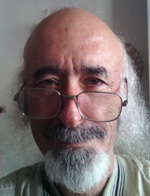By Dan Bloom

CHIAYI CITY, Taiwan — Don’t tell me there’s no sci-fi in Israel because there is, and Moran Chaimovitz, a 30 year old writer in Tel Aviv, has just published a novel in English to prove it. It’s called Human Again and the 150-page debut novel is set in Israel some 300 years in the future where an IDF soldier who died in 2006 has been resurrected after being cryo-frozen for three centuries.
That’s sci-fi, for sure. In fact, the subtitle of the book is Cryonemesis One.
I met Chaimovitz online a few months ago as part of my global ”cli-fi” work, and when he told me he was about to publish an Israeli novel in English with a strong climate theme, I jumped at the chance to interview him.
“In my futuristic novel, a climate crisis has forced survivors to go underground in the Judean hills to find shelter,” he told me. “In that underground city, people are spending their time inside a virtual reality world that keeps everyone occupied and sane. But it also makes them too dependent on technology and generally numb, hence the desire for society to become human again, and this my title.”
“Cryonemesis is a name I coined for the novel by combining “cryogenics” and “nemesis,” he added. “It the novel’s tone as a combination of future technology, a sinister element and the conflict between both, and it involves all the elements I’d like to see in a sci-fi book.”
The main character’s name is Roy, and according to the author, Roy died during a battle in the second Israel-Lebanon war in 2006. It’s based on a bit of reality, too.
“I participated in that war as a Navy soldier,” Chaimovitz San Diego Jewish World. “That’s the only element in the novel that’s based on a real historical event. Everything else is made up. I’m a storyteller.”
In the novel’s time frame, Israel no longer exists as a state, author told me. The region holds only three underground shelter cities for the survivors of a prolonged climate crisis, and main city is called New Knaan.
As you can imagine, in this sci-fi dystopian story, with a future climate crisis theme, survivors outside of the shelter cities are fighting over the scarce resources that are out there.
“Inside the city there’s a mix of Israeli Jews and Arabs that found a common ground by using Hindu culture as a bridge,” Chaimovitz, whose grandfather was born in Czechoslovakia, told me. “In my vision, the only country that can withstand a climate crisis in the future is India because the majority of the society is already cooperating under severe economic conditions today. That’s why most of the characters in my book have Hindu names.”
In the novel, the Israeli coastline is under water, daily temperatures are unbearable, and strong winds blow dust and rocks. The shelter city was built to last 1000 years and to be self-sufficient. It uses solar power, wind and sea currents turbines to produce electricity and to desalinate water. It’s also built deep enough to withstand bombings and other man-made dangers. As you can see, sci-fi has come to Israel.
I asked Chaimovitz if sci-fi was a popular genre in Israel.
“Only among the younger generations, kids and teenagers,” he said. “They love fantasy and sci-fi as much as any teenager anywhere in the world. But generally speaking, sci-fi and fantasy genres are just starting to become popular in Israel. Most Israeli adults prefer realistic contemporary or historical novels. It’s a cultural thing, because we’re hooked on daily news reports, and our reality here is really hectic. We tend not to run away from it to other fictional world because our reality in Israel is crazy enough.”
Chaimovitz did his research, too.
“When I looked at the social implication of rising temperatures in today’s world and in a future world, I looked at modern day Syria and Iraq, and how the rise of ISIS is tied to the population immigrating out of drought stricken areas,” he said. “When farming of crops becomes impossible on a global scale, the world economy collapses. When there’s no rice, wheat and corn available, no money and no fancy technology can save you.”
New Knaan, with a population of about 10,000 people, is administered by a woman named Padma, who is president of the city and the engineers who monitor the systems. But behind the scenes it’s the quantum systems that run things.
Chaimovitz said he wrote the novel in English, his second language, and that there is no Hebrew version for now.
“English is my second language, but I felt confident enough to try to write a novel in English with the help of a book editor in the U.S.,” he said. “I wanted to detach myself from Hebrew so I could look at the characters from an artistic distance,” he said. “I felt I was aiming a local story for a global audience, and I didn’t want to write the novel and then translate it. The idea was germinating in me for about five years and sparked in a screenwriting class I took in university. For my screenplay concept, I wanted to write a funny science fiction movie about dating in the future. But it has all turned out completely different. I’m a novelist now.”
Human Again is available worldwide in English via Amazon’s book site.
*
Bloom is a freelance writer and email correspondent based in Taiwan. He may be contacted via dan.bloom@sdjewishworld.com . Comments intended for publication in the space below MUST be accompanied by the letter writer’s first and last name and by his/ her city and state of residence (city and country for those outside the United States.)